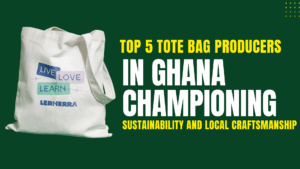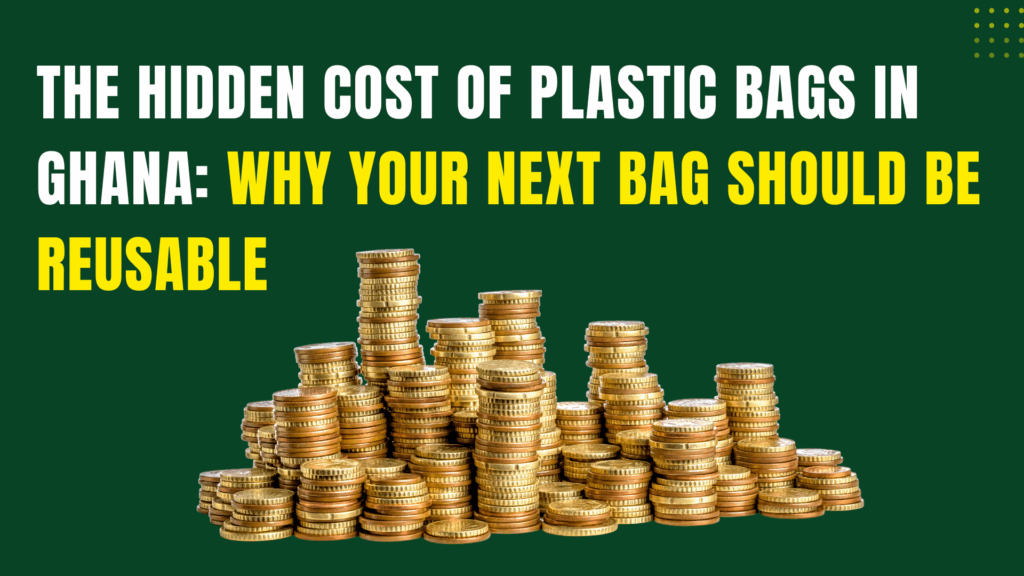
The Hidden Cost of Plastic Bags in Ghana: Why Your Next Bag Should Be Reusable
- By apentengcollins
- June 6, 2025

Walk through any bustling market in Ghana from Kaneshie to Madina and you’ll see the telltale signs of a growing environmental crisis. Single-use plastic bags litter streets, clog drains, and float in our waterways. What was once seen as a convenient packaging solution has become one of the country’s most pressing threats to public health, infrastructure, and the environment.
Each year, Ghana produces an estimated 840,000 tonnes of plastic waste, and alarmingly, less than 10% of this is recycled. The rest ends up in our streets, gutters, oceans, and even our food chain. The consequences are not just environmental they’re deeply personal and economic.
Communities across Accra, especially in areas like Adenta, Madina, and Lapaz, experience severe flooding whenever it rains largely due to plastic waste among many other reasons. Single-use plastic bags, often discarded carelessly after a single use, block gutters and drains, preventing rainwater from flowing properly. When these drainage systems are clogged, even moderate rainfall can cause the roads to overflow and homes to flood.
The impact is wide-reaching. Children can’t get to school, shops and markets are forced to shut down, properties are damaged and lives lost . In low-income areas, where infrastructure is already under strain, the situation is even more dangerous. Floodwater mixes with waste and sewage, exposing communities to diseases like malaria, cholera, and typhoid.
These recurring floods are not just seasonal inconveniences they are a major health risk and an economic burden. Reducing our dependence on plastic and switching to reusable bags is one small but powerful way to keep our drainage systems clear and our neighborhoods safe.
Much of our unmanaged plastic waste finds its way into the ocean, where it devastates marine life. Fish and turtles often ingest plastic, mistaking it for food. This not only disrupts the marine ecosystem but also affects fishing communities whose livelihoods depend on clean, thriving waters.
When plastic waste ends up in agricultural areas, it leaches harmful chemicals into the soil. This affects crop health, reduces yields, and poses long-term risks to food security.
In many communities, plastic waste is burned as a form of disposal. The smoke released contains toxic chemicals like dioxins and furans, which are harmful to both the environment and human health. Children, the elderly, and those with respiratory conditions are particularly vulnerable.
The good news? There’s an easy and impactful alternative: reusable bags.
Switching to eco-friendly tote bags in Ghana can lead to:
Reusable bags are durable, washable, and affordable making them perfect for everything from a quick grocery run in Madina to a full shopping trip at Accra Mall.
By using reusable bags, you’re also contributing to Ghana’s growing circular economy—where materials are reused, recycled, and given a second life. Brands like Reusable Bags Gh are leading the charge by:
– Sourcing local, eco-friendly materials
– Providing employment to Ghanaian artisans
– Offering custom-branded, reusable alternatives for events, markets, and shops
Every plastic bag avoided is a step toward a cleaner, healthier Ghana. At Reusable Bags Gh, we’re proud to be one of the top eco-conscious businesses in Ghana offering affordable, high-quality custom tote bags that blend sustainability with style.
✅ Order your reusable bags
✅ Custom brand your business or event
✅ Make a lasting impact
Connect with us on Instagram